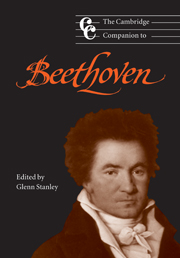Book contents
- Frontmatter
- Part I A professional portrait
- 1 Some thoughts on biography and a chronology of Beethoven's life and music
- 2 Beethoven at work: musical activist and thinker
- 3 The compositional act: sketches and autographs
- Part II Style and structure
- Part III Genres
- Part IV Reception
- Notes
- Selected further reading
- General index
- Index of Beethoven’s compositions and sketches
- Plate section
2 - Beethoven at work: musical activist and thinker
from Part I - A professional portrait
Published online by Cambridge University Press: 28 September 2011
- Frontmatter
- Part I A professional portrait
- 1 Some thoughts on biography and a chronology of Beethoven's life and music
- 2 Beethoven at work: musical activist and thinker
- 3 The compositional act: sketches and autographs
- Part II Style and structure
- Part III Genres
- Part IV Reception
- Notes
- Selected further reading
- General index
- Index of Beethoven’s compositions and sketches
- Plate section
Summary
Beethoven's professional life in Vienna was largely defined by his lack of institutional employment. Only his deafness had an equal impact on his career. In Bonn he had served the electoral court, playing organ and viola, and was expected to resume his duties after a period of study with Haydn that began in 1792. But the cessation of his salary in 1794 (perhaps for misleading the Elector Max Franz about his progress and refusing to return home) and the collapse of the electoral court in the French controlled Rhineland later in that year did not bode well for his prospects in Bonn, and the freedom and opportunities he enjoyed in the imperial city outweighed the strength of long friendships and familial obligations he had left behind. His concerted attempt to secure an appointment, with the Vienna Court Theater in December 1806, not surprisingly failed: after the problems and acrimony surrounding the performance of the first two versions of Leonore (Beethoven's original title of Fidelio) in 1805 and 1806, the directors apparently did not even respond to his multi-year offer to compose one opera and a smaller dramatic or choral work per annum. Beethoven sought the position, which would have allowed him ample time to compose instrumental music of his own choosing, despite continuing material and social support from a group of Viennese aristocrats who in the 1790s had eased his entry into Viennese cultural life.
- Type
- Chapter
- Information
- The Cambridge Companion to Beethoven , pp. 14 - 31Publisher: Cambridge University PressPrint publication year: 2000



